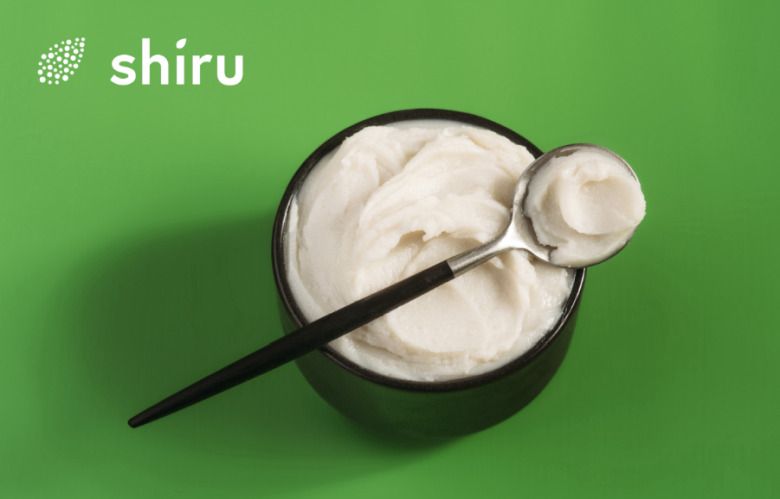California-based startup Shiru has identified plant-based proteins that can be combined with healthy oils to create structured fats that can replace saturated animal or tropical fats such as palm or coconut oil in multiple applications.
Solid at room temperature, patent-pending OleoPro “looks and behaves like animal fat,” without its ethical or environmental impact, and contains 90% less saturated fat.
OleoPro can also replace highly saturated tropical oils such as coconut or palm oil, which present nutritional, sensory, and environmental challenges, founder and CEO Dr. Jasmin Hume told AFN. This is particularly exciting in plant-based meat applications, where it can replace coconut oil, “dramatically reducing” saturated fat and improving performance, she claimed.
“Data indicates that OleoPro demonstrates lower cooking loss, which results in a juicier sensory experience compared to a plant-based burger made with coconut oil. OleoPro also holds its shape, forms a stable emulsion, and browns when heated, a technical feature traditional plant-based fats cannot provide.”
‘Depending on the oil used, we can tailor the properties’
Founded by Dr. Hume in 2019, Shiru uses machine learning and bioinformatics to mine databases of plants to identify proteins with specific functional qualities. It closed a $17m Series A round backed by S2G Ventures, Lux Capital and CPT Capital in 2021 and has recently established partnerships with ingredient giants CP Kelco and Puratos to develop label-friendly alternatives to methylcellulose and eggs.
In some cases, it will extract proteins from plants, in others, it may express them via genetically engineered host microorganisms such as yeast or fungi.
In this case, Dr. Hume told AFN, “OleoPro is not produced via precision fermentation. Instead, it leverages a blend of commercially-available plant protein isolates and oils produced via a proprietary process that can be used to create a protein-based, structured fat from a range of unsaturated liquid oils including sunflower, canola, and soy, for
example. Depending on the oil used we can tailor the properties and end applications.”
She added: “Our IP protects the unique protein insights and processing that enable OleoPro’s production. It also protects the product itself as differentiated from traditional oleogels.”
The plan is to begin commercial production with a contract manufacturer later this year, she said. “Because we are leveraging commercially available input ingredients and conventional food processing technologies in a unique way, there are no special regulatory approvals required to bring OleoPro to market.”
“Our testing revealed OleoPro to be a promising fat solution for alt meats, demonstrating superior performance in approximating beef fat compared to a range of plant-based fat systems in the market.” Daniel Davila, senior food scientist, UPSIDE Foods
OleoPro: ‘Smooth and lubricating, delivering a juicy, fatty mouthfeel in plant-based meat applications’
OleoPro is self-standing (holding its shape at room temperature), browns when cooked, and is “smooth and lubricating, delivering a juicy, fatty mouthfeel in plant-based meat applications,” claimed Dr. Hume, who is currently working with a variety of food and cosmetics companies interested in using the fats.
“Oils commonly used in plant-based meats today, like palm and coconut, are disastrous for the environment and aren’t great from a health perspective, either,” she said. “OleoPro is a brilliant alternative.”
While initial development has focused on plant-based meat applications, Shiru is exploring additional applications, she added.
“We’re currently exploring its potential to replace the fat component in plant-based dairy (soft cheeses, creamers, butter) and bakery (cakes, whipped toppings, frosting). In personal care, we’re exploring its potential to replace palm, coconut, or petroleum-based oils often used in body butter, lip balm, and hair conditioner, as well as to replace irritating, chemical-based emulsifying ingredients often used in mineral sunscreens, lotions, and face masks.”
OleoPro will be on show at the Future Food-Tech conference in San Francisco later this week as part of a plant-based karaage (Japanese fried chicken) product developed by Nourish Ventures, the corporate venture arm of Griffith Foods.

Machine learning
So how does Shiru’s machine-learning approach identify promising proteins?
A conventional approach might be, “Here’s an egg protein that’s folded in this way, let’s find some plant proteins that fold in a similar way,” Shiru’s VP business development, Julian Lewis told trade publication FoodNavigator-USA last year.
“What we’re doing is using something called embeddings, which is based on natural language processing (NLP), a bit like when you do a Google search and one word leads to another word, and there are no similarities between those words, but they mean the same thing.
“And we think of that approach to find proteins in our database that superficially have no connection with, let’s say, egg ovalbumin, but through this NLP-based approach, we’re able to have a high degree of confidence that there will, in fact, be a functional connection.”
After promising candidates are identified, the next step is determining whether they are expressible at any useful level by microbes via precision fermentation by using a trusted microbial strain. This then generates a shortlist of candidate proteins that will be produced in small quantities and tested to see if they deliver the kind of performance Shiru is looking for.
“We’ll then start developing tailored strains that can deliver the highest performing economic yield.”





